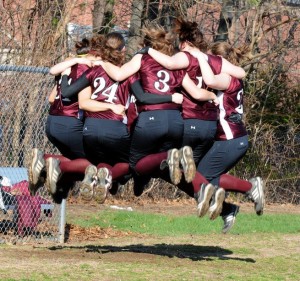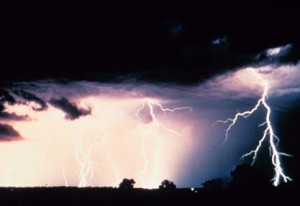Recipe for a Team
 I sit in the bleachers next to my dad and try to pretend like I’m not crying.Â
I sit in the bleachers next to my dad and try to pretend like I’m not crying.Â
I watch my mom cheer along with a dozen high school girls, all in various stages of elation (tears, screaming, laughing), as one of them hoists a trophy over her head and presents it to the crowd as if to share it with them. I can already see that image in the local papers, along with a similar picture of that very girl—the lone senior and captain on the roster—hugging my mother, her coach.Â
My mom coaches varsity softball in my hometown, and over the last few years she has enjoyed an impressive series of winning seasons. Tonight’s win marks her second regional championship, and redemption after a disappointing loss that unexpectedly knocked her team out of play-offs last year.Â
I flew home to surprise my mother in the middle of the series, hoping to meet and cheer on the girls through to the last games of their season. I’d heard about them in every conversation with my mom for the last four months—just see the recipe below.
And so it is that I hold back tears as I watch these girls celebrate. I just met them, but I know them nonetheless. What is it about girls’ sports that makes these moments so special? In this case, with these teammates, it’s the level of support that they offer each other. It’s the unique personalities that they celebrate, in turn, about each other. I’ve experienced that type of respect and love enough times to recognize it when it’s there.Â
When we get home from the game, I sit down with my parents for a celebratory drink. My mom’s best friend—a teammate of hers from college, as a matter of fact—and her husband join us. An outstanding athlete himself in his own day, Norman comments on the game:
“You know what’s different about girls’ sports?†he asks us rhetorically. He talks about how when he played baseball, no one talked to you when you struck out at a critical point in the big game, or told you it was going to be okay. You put your head down, he says, grabbed your glove, and waited in shame for the inning to end so that you could attempt to redeem yourself. He points out that in tonight’s game, when one of the girls would strike out, her teammates patted her on the back, hugged her, and told her to keep her head up. Â
We all nod at him in agreement. I recall how, in the last of my mom’s games that I’d watched, the girls all hollered at me from the bus after the victory.
“You’re good luck, Colleen!†they shouted. They wanted to share their success with me—someone that they’d just met the day before. They wanted everyone to be a part of the win.  I neglected to point out to them that they’d managed to win every single game already this season despite my absence up until that point.Â
I’ve certainly been a part of teams that were more Mean Girls than The Sisterhood of the Travelling Pants, but my mom’s current team is full of encouraging, kind, positive young women. And that’s the kind of team that makes me want to cry, whether they win or lose. They’re the young women that remind me why girls’ sports are so valuable.Â
Aside from the confidence and positive body image that studies show girls develop through athletics, it’s the relationships and the team mentality that stand out to me now. Amidst the cyber-bullying, teen mom reality shows, and vampire-boyfriend romances that dominate teenage culture right now, girls’ sports have stood strong as a place where young women love each other for their talents and for who they are, rather than what they look like or who they date. They build each other up and work together; they accept each others’ flaws and admire their strengths; they mourn the losses and they revel in the wins together. Just like Emily raising the trophy to the stands to share it with as many people as she can, these girls are selfless and sacrificing for each other. They are a unit. A thriving, cooperative, generous team in the purest sense of the word.Â
I’m almost envious that they have each other, and then I remind myself that I’ve had that before myself, and that I’m a better person because of it.
Recipe for a TeamÂ
Ingredients:
1 good-natured, college-worthy pitcher with a staggering record of strikeouts (junior)
1 powerful, smart, over-achieving catcher (junior)
1 fiery and fast-as-lightning short stop, preferably already having made a verbal
commitment to a college team (junior)
1 third-baseman with soft hands that pick up every bunt and eat foul balls alive (junior)
1 designated hitter whose self-esteem will benefit from media praise for her
performance (sophomore)
1 first-baseman who has also played the lead in the school musical, with a voice and
energy that can barely be contained on the field (junior)
1 second-baseman with a challenging home life, hailing from a famous baseball family
(sophomore)
1 quirky and clever, hard-hitting leftfielder (sophomore)
1 young right-fielder, still acclimating to life as a varsity athlete (freshman)
1 spunky, determined leader in centerfield (senior; captain)
*Blend pitcher and catcher until firm. Repeat ground balls and double-plays with remaining infield ingredients and combine the two mixtures. Pepper outfield with pop-flies and hard skipping ground balls until tough. Add to remaining ingredients. Sprinkle with team bonding activities, fund-raising efforts, and a challenging spring schedule. Place on a newly-skinned field. Add heat and enjoy the show.






